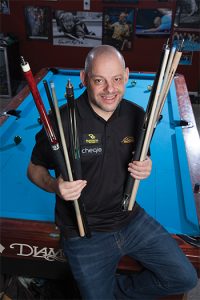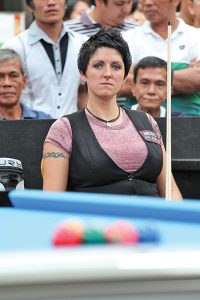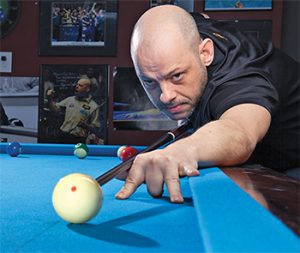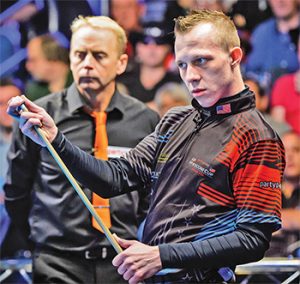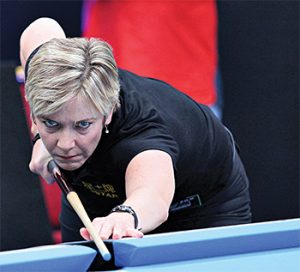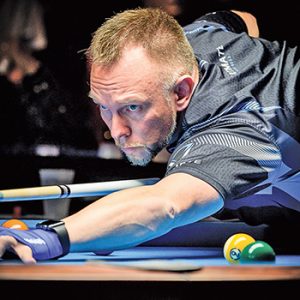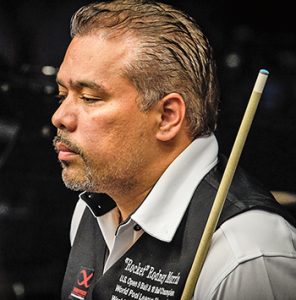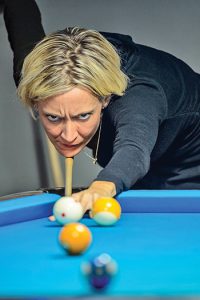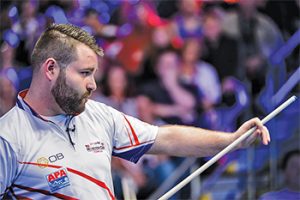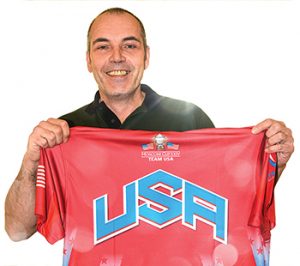Appleton, Rossman Elected To BCA HOF
Darren Appleton was already 30 years old when he made the move from English 8-Ball to American Pool, and soon thereafter from Yorkshire, England, to the United States. But in 11 short years, the doggedly determined former boxer made an indelible mark on the game, winning three world championships in three different disciplines and nearly a dozen more major titles. For his efforts, Appleton has been elected into the Billiard Congress of America Hall of Fame, the BCA announced today.
Appleton, 41, who will enter pool’s most prestigious hall in the Greatest Players wing, is joined in the Class of 2017 by trick shot impresario and enthusiastic pool ambassador Tom Rossman. Rossman, 69, was elected into the Meritorious Service category. Voting was conducted by the United States Media Association. “It’s amazing to know that I’m in the BCA Hall of Fame,” Appleton said. “I can’t really put it into words. There is no bigger honor for a pool player. This is the pinnacle.”
“I’m humbled and honored to be elected into the BCA Hall of Fame,” Rossman concurred. “The Hall of Fame designation is extra special in so many ways. When a person connects with his or her dreams, visions, blessings and passions in a heartfelt manner, he or she may truly rack up a victory in the game and, more importantly, in life.”
After a decade during which he was the world’s top-ranked English 8-Ball player seven times, Appleton made his move to American Pool in 2006. After honing his skills in the Philippines over the course of the next two years, Appleton shocked the pool world by winning the World Pool-Billiard Association (WPA) World 10-Ball Championship in 2009. Over the next five years, Appleton would add the WPA World 9-Ball Championship (2010), the World Pool Masters (2009), World Games gold medal (2013) and back-to-back U.S. Open 9-Ball Championships (2010, ’11), International Challenge of Champions (2011, ’12) and World Tournament of 14.1 (2013, ’14) titles to his collection. In 2015, Appleton won his third WPA world title when he captured the Chinese Pool World Championship.
Rossman has been one of pool’s leading trick shot experts, teachers and ambassadors for nearly 40 years. He is considered the founding father of the “Artistic Pool” movement, and is credited with getting the discipline accepted by the WPA. Rossman logs tens of thousands of miles each year putting on exhibitions and teaching junior players and new enthusiasts.
Appleton was named on a whopping 87 percent of the ballots in Hall of Fame voting, easily outdistancing Women’s Professional Billiards Association champion Gerda Hofstatter. Hofstatter was named on 47 percent of the ballots. Vivian Villarreal, Jeremy Jones and Shannon Daulton were also on the ballot. Rossman was recommended by the Meritorious Service Committee, and was confirmed with 90 percent approval by the Hall of Fame Board.
Appleton and Rossman, the 69th and 70th members of the BCA Hall of Fame, will be formally inducted during ceremonies later in the year.
Ruijsink to Coach U.S.
Ruijsink replaces Mark Wilson, who helmed the U.S. squad for three years, coming closest to victory in 2015, when the U.S. lost, 11-7.
With Team USA posting just one win in the last 11 Mosconi Cups, Matchroom said it was seeking a game-changer to “revive America’s flagging fortunes,” even if it meant appointing a European coach.
The announcement caught many American players and fans by surprise. Numerous posts on social media decried the decision as “an insult to the Americans,” while others applauded the selection as America’s “best chance” to become competitive again.
“The reason to take on this job is quite obvious,” Ruijsink commented in the Matchroom release. “I am an authentic lover of the game and especially of the Mosconi Cup. In 25 years of coaching, the Mosconi Cup has proven to be by far the most exciting event in the world of pool.
“As a coach in pool, there is no higher goal then working in the ‘home of pool,’ the U.S.A. My entire coaching career has been founded on seeing the American players compete at the World Championships in Bergheim, Germany, in 1990. There I saw Earl, Varner, Davenport, Mizerak, Mataya, Lebron and a young Johnny Archer, and they made me love the game even more.”
Ruijsink is credited with coaching Holland into a pool powerhouse, mentoring stars like Alex Lely, Niels Feijen and Rico Diks in the ’90s and early 2000s. In recent years, he has been coaching in Russia, developing a talented crop of players, including recent World Pool Series champion Ruslan Chinahov.
“I was shocked at first,” said American Justin Bergman, who has played on the last three U.S. squads. “But I don’t think it’s a horrible idea from a player’s view, since he probably has good ideas and he’s a knowledgeable coach. I think we should all support him.”
“I think it’s good, since he was so huge for Europe’s team,” echoed Skyler Woodward, Team USA’s best player over the past two Mosconi Cups.
According to Matchroom, Ruijsink will get to hand pick his five-player team, so long as each player is ranked in the top 10 in Mosconi Cup points in 2017. Additionally, Ruijsink plans to travel to the U.S. several times during the year to meet with and observe potential team members.
Ruijsink’s first decision was selecting Archer as his vice-captian.
The Big Time
It’s been 10 years since the International Pool Tour died. How will history judge the short-lived $13 million venture that showed the promise and peril of attempting to bring pool into the big time?
By Nick Leider
It almost seems like a fever dream, now that it’s been a decade since its death. The International Pool Tour, founded and funded by infomercial maven Kevin Trudeau, held four events in 14 months that awarded more than $6 million in prizes. Pool had not seen — and most likely will not see — anything like this in the history of the sport.
Efren Reyes, winner of two tournaments, pocketed $765,000. The matches were live broadcast across Europe in primetime. Players were told of guaranteed income in the six figures.
But now, 10 years after the IPT’s final event, the World Open, left players with little more than IOUs for $3 million, Billiards Digest revisits the IPT’s unbelievable rise and equally astonishing fall. While setting the record straight on what remains one of the most controversial eras in modern pool, one question begs for an answer:
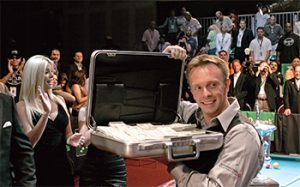
Though short-lived, the IPT still showered pros like Thorsten Hohmann with briefcases full of cash.
What was the IPT’s lasting effect on the game we love?
The Facts
Before telling the story of the IPT, it’s imperative to present the facts that are often lost in the legend of the IPT.
First, every player who won money received what they were due. The $3 million in prizes from the World Open, the abbreviated tour’s last stop, were awarded, though it took 14 months and a series of installments to meet the tour’s obligations.
Second, players did lose $2,000 paid to play in qualifying events for a tournament that never happened. The IPT postponed and then cancelled its future events, leaving those who had ponied up that qualifier money without recourse.
“Some players received that money back and others did not,” said Deno Andrews, the IPT tour director who handled day-to-day operations. “I can’t remember how many ended up losing that money. It was not that many players — with that said, any [number] more than zero was too large.”
Finally, among the top players who competed on IPT, the consensus was that, despite the missteps, broken promises and eventual failure, it was a good thing while it lasted.
“My brothers on tour, we were all really happy about Trudeau and the IPT,” said Rodney Morris, who earned $150,000 with a runner-up finish at that maligned World Open. “We made some money and we had a great time. We were more than happy to be a part of it. We wished things would’ve worked out, but I have nothing against anyone.”
Thorsten Hohmann, who netted $350,000 by winning the North American Open, agrees.
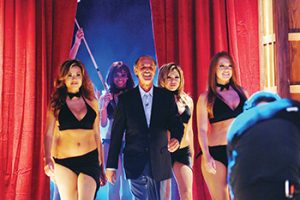
Trudeau’s events were lavish affairs, brimming with pomp and circumstance, as showcased in the Battle of the Sexes match between Loree Jon Hasson and Mike Sigel.
Still, the IPT, coming on so strong and crashing so quickly, affected much more than players’ bank accounts. To see these impacts, it’s worth starting at the beginning.
The First Time
The World Championship Open (Aug. 20, 2005)
Trudeau’s entry into professional sports was a moment of serendipity for pool, a bit of luck for a sport that desperately needed it. The women’s game, buoyed largely by the WPBA Classic Tour, was in decent shape, with events regularly appearing on ESPN and top players able to support themselves with tournament winnings. The men’s side, though, had little as far as organization. The Professional Billiards Tour Association had collapsed in the decade prior. Outside of a few big world championship tilts and the annual U.S. Open 9-Ball Championship, organization was minimal and cooperation was almost nonexistent.
The seeds of the IPT, though, were planted a decade earlier in 1994. Trudeau was already a successful businessman, but he was not yet riding what would be a wave of commercial success based largely on his “Natural Cures” brand, including a New York Times bestselling book and ubiquitous late-night infomercials. Long a fan of pool, he caught a radio advertisement for an exhibition in the Chicago area featuring Hall of Famer Mike Sigel.
“Kevin got in touch with me saying he wanted personal lessons,” Sigel said. “We became friends and I would see him every few weeks. And then I got it in my mind. I said, ‘Hey, you got all this money and you love pool. Let’s do something for the game.’
“I nagged him for 10 years, saying we should do something together. Finally, one day when we were playing pool, he said, ‘Let’s do it.’”
The two scribbled down some notes about prize money. Sigel imagined top prizes around $100,000, with other top finishers pocketing proportionally big bucks. Trudeau, though, had bigger ideas from the start.
“He looked at all that, without even adding it up,” Sigel said, “and he said it’s got to be bigger. For him, from the start, it wasn’t a matter of doing something. It was a matter of how big it was going to be.”
Eventually, the plan was to hold a kickoff challenge match in August 2005 between Sigel and fellow Hall of Famer Loree Jon Jones in Las Vegas. Dubbed the World 8-Ball Championship, the battle of the sexes paid the winner $150,000 with a consolation prize of $75,000. Trudeau threw a lavish party the night before the event, replete with celebrities. On the day of the Sigel-Jones match, the celebrities (actors Paul Sorvino, Allison Janney and Anthony Anderson, rapper DMX and boxing legend Thomas Hearns among them) entered the arena in true red carpet style.
Deno Andrews was taken with Trudeau’s insistence on this being like nothing pool had seen before.
“Everything had to be big. We did nothing half-assed,” Andrews said. “What gets him going is entirely different than what gets the rest of us out of bed. He wanted it big and he wanted it immediately.”
By August, the IPT had crash-landed on the pool world.
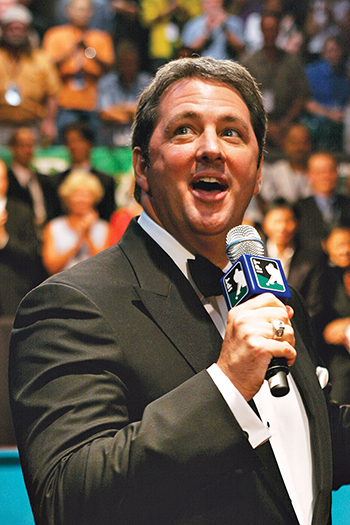
With media maven Trudeau at the helm, “everything had to be big.”
If a guy wanted to get pool players’ attention, big money and bright lights aren’t the worst ways to do so.
The Best of Times
The King of the Hill 8-Ball Shootout (Nov. 30-Dec.4, 2005)
The North American 8-Ball Championship (July 22-30, 2006)
The IPT initially started with 150 players hand selected by Trudeau and the IPT brass. Potential tour members had to apply for a spot on this lucky list, which may be the first and only time pool players put together resumes en masse.
A group of players automatically qualified based on past performance. Think Johnny Archer, Efren Reyes, Rodney Morris and other world-class talents. A dozen living Billiard Congress of America Hall of Famers received automatic entry and a $30,000 bonus simply for being part of the tour. Other players had to apply to tour membership. Darren Appleton, then a professional English 8-ball player but largely unknown in the U.S., emailed his application to the tour hoping that his unmatched record in a slightly different discipline would earn him a spot. (It did.)
The King of the Hill event, however, would only see 42 players compete for the $1 million prize fund, with $200,000 going to the winner. Still, the IPT managed to get all 150 players to Orlando for the event, because a mandatory players meeting promised to detail just what the tour had in store for its first year.
“It was the greatest speech I’ve ever heard,” said Thorsten Hohmann, of Trudeau’s pitch to the players. “It was incredible. I wasn’t really too aware of everything until I got to Orlando and heard Kevin. That made me realize: Holy shit. This is something big.”
Appleton, whose involvement with the tour led to him ditching English 8-ball for the American variety, was equally blown away.
“That players meeting, [there] was amazing excitement. I felt like a professional sportsman,” he said. “This was the biggest thing to happen for pool.”
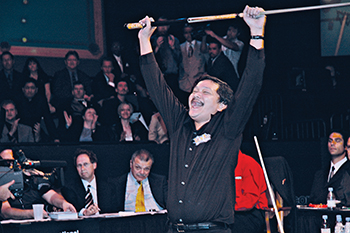
Reyes scored pool’s biggest ever prize.
Six months later, the North American Open brought 200 players to the Venetian in Las Vegas for a chance at the $2 million purse. The top prize was $350,000, the biggest single payday in the history of pool. EuroSport was broadcasting the event live in primetime. Deals were made with Outdoor Living Network to replay the matches for North American audiences. Before a ball was struck, this event was the most significant tournament in years.
The grueling round-robin, multi-round format had players playing four or five race-to-8 sets a day, often clocking more than 12 hours at the table. Hohmann eventually prevailed over Filipino snooker convert Marlon Manalo. But what happened on the table took a backseat to the event itself. The bright lights, the professional production, the class of such an event seemed to mark pool’s arrival as a legitimate sport.
But just two months later, at the IPT’s fourth event, the wheels fell off what everyone thought was pool’s gravy train.
The Worst of Times
The World 8-Ball Championship (Sept. 3-9, 2006)
The World 8-Ball Championship began with Trudeau announcing the cancellation of a scheduled event in London, which had some of the 200 players nervous about what was to come. Regardless, the $3 million prize fund went a long way to relieving any anxiety among the players.
The grueling tournament schedule, again having players compete nearly nonstop for days at a time, left Rodney Morris facing Efren Reyes for the $500,000 top prize. The on-table action ended with the Filipino legend pocketing the top prize while Morris “settled” for $150,000.
Or so it seemed.
All the players left the Grand Sierra Resort and Casino in Reno, Nev., with nothing. Players walked away with promises of future payments, but concerns that were raised at the players meeting became very real for those with a stake in the game.
“That Sunday, Kevin came to me and said the money wasn’t in the bank,” Andrews said. “I’ll never defend him not paying the players. That was wrong and it will go down in history as wrong. But I told him, 100 percent, he needs to pay the players and he said he would.”
Rumors circulated about a proposed deal with Stanley Ho, a billionaire casino magnate based in Hong Kong, to buy the tour. The supposed windfall from this would have supported the tour’s future, Trudeau insisted. But an agreement never materialized. Also, on Oct. 13, 2006, President George W. Bush signed into law the Unlawful Internet Gambling Enforcement Act, which outlawed wagering over the Internet for individuals in the U.S. This, according to the IPT, impacted the tour’s ability to market itself to potential buyers.
Over the course of 14 months, in nine installments of 11 percent, the payments arrived. All the while, no further tournaments were scheduled. The IPT staff, once more than 20 people, was slashed to a skeleton crew of five. Unable to produce profits through events, Andrews pivoted to reducing costs and raising what revenue he could through streaming recorded matches online, selling DVDs and collecting TV and product royalties.
The money wasn’t flooding in, but it was substantial enough to cover roughly half the amount owed to players, according to Andrews, with Trudeau covering the remainder.
“He could’ve filed for bankruptcy,” Andrews said. “He could’ve stiffed the players, but two months after that tournament, I did everything I could to persuade him to commit to paying the players.”
While the payments trickled out, the IPT held seven challenge matches, one-on-one events that were streamed online. The response was tepid and a steep decline from the glitz and glamor of the major tournaments that preceded them. The tour continued on in a sense, but it was evident to everyone within the sport that the IPT of 2007 was a far cry from what the tour had been just months before.
With the future of the IPT falling well short of expectations, Sigel took issue with players who quickly lost faith in the IPT.
“When players started knocking [Trudeau], I couldn’t believe it. That has to leave a bad taste in your mouth,” he said. “That’s when I thought, if it was me, I wouldn’t pay them and just go bankrupt. But he paid him. That’s the kind of guy he was.”
Andrews, however, puts blame on those around the game.
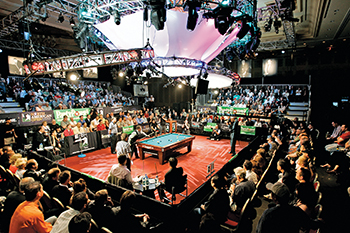
No expense was spared in the production of IPT events, including a sparkling arena to dazzle the masses.
Regardless of where blame lies, those who had the most to gain from the IPT adventure felt a real sense of loss once it was clear things weren’t going to turn out as advertised.
“I had a chance to win $500,000 and then I had to go try to win $10,000?” Morris said. “I lost a lot of motivation. I did a lot of soul searching at that time. For about a year there, I didn’t know what I was going to do. I was depressed for a while.
“It was real hard. I didn’t want to play at all. For a year, I was in a coma. I could’ve been on the “Walking Dead” — just walking around without an idea.”
Hohmann, another player who had profited immensely from the IPT’s short run, expressed similar feelings.
“It wasn’t like the tour ended at once,” he said. “It was a bit of a slow death — them dragging it out with exhibition matches. Of course I fell into a slump … It took me a few years to recover from that. You have these high expectations and then you’re back to playing in tournaments where you’re walking away with $2,000. It was hard.”
The End of Times
Once the players had been paid in full, Andrews met with Trudeau to discuss the IPT. More than $13 million had been invested, including prize money, production costs and marketing. The operation, already stripped to its bare minimum, was barely paying for itself.
The IPT, as it had been packaged from the beginning, was all but dead and buried. At that point, pool’s golden goose decided to pull the plug.
The slow death, as Hohmann put it, had come. But now, in 2016 and a decade after the cash was stacked on the pool table at the first event, the question still remains: Was the IPT a net positive or negative for pool?
“It was good,” Sigel said. “To this day, I defend the IPT whenever I hear someone talk about it. Add up all the money in the years before and after and it won’t come close to the $13 million Kevin put into the game.”
Sigel, who first hatched the concept of the IPT, agrees with Andrews, who was involved in the execution of that idea.
“Ultimately, it was good,” Andrews said. “If you remember what it was like before the IPT, it was very similar to what it is now. It was exactly like it is today … We created an entirely alternate universe for pool. It happened in a vacuum and ultimately I don’t think it had much of an effect on pool. It didn’t impact the actual state of the sport today.”
“He invested an amazing amount of money and it was great,” Appleton said. “I started playing American pool because of the IPT. I have that time to thank for my career and everything I’ve achieved since then.”
“Pool players can be some of the most loyal, trusting and straightforward people,” Andrews said, who continued to work with Trudeau until 2013. “Really the promoters are goofier than the players. The players show up, they pay their expenses, they pay the entry fees, they practice. They do all this stuff, and it’s such a basic thing: Pay them on time.
“I still hear about this. The money isn’t there or the added money was different than what was published … We were as guilty as anybody, but the players were overwhelmingly supportive.”
MAKE AMERICA GREAT AGAIN
Mark Wilson announces his resignation as Team USA Captain, today, Dec. 22, 2016.
I had a lot of time to think on the flight home from London, where Team Europe pasted Team USA in the Mosconi Cup. The final score was 11-3, which is bad enough. But it was the way Team Europe rolled to victory that really gave me pause. The Europeans were machinelike in their execution. They simply didn’t miss. They didn’t make mistakes. It was actually a beautiful thing to watch. For the stats-driven fan, Europe posted a collective .899 Total Performance Average over the four days. A .900 TPA is considered “world class.”
Professional level is .850. Team USA’s cumulative TPA during the event was .838. The difference is glaring. The beat down was so thorough, talk spread through the event that, after 23 years, the Mosconi Cup’s future could be in peril.Matchroom’s Barry Hearn even went so far as to announce his intention to start a Europe v. Asia event, to “test the Europeans.” Personally, I don’t buy the notion that the Mosconi Cup as we know it is in peril. At least, not yet. Defenders point out that the U.S. dominated the early years in the same way. During those years, however, Europe was continually closing the gap. Anyone who has watched the last five Mosconi Cups can see that the gap between the sides is widening.
What I see, though, are ticket sales and television deals that have grown exponentially over the past fouryears. Europe against the U.S. in tiddlywinks would draw a passionate crowd. Still, it is painfully obvious that Team USA needs to do something dramatic to make this a horserace again.
Which brings us to Mark Wilson. Three years ago, Wilson, one of the game’s top instructors and most ardent supporters, presented Matchroom with a three-year plan to get Team USA back on track. He stripped down the squad and rebuilt it based on character and commitment. In his spare time, he generated more interest and enthusiasm in the U.S. for the Team USA “program” than anyone before.
The results? The first year of the experiment resulted in a one-sided match, which was somewhat predictable. The second year showed promise, with Team USA gamely battling well into the final day. The third year, however, was a disappointing step backwards. As it is wont to do, social media exploded with posts slamming Wilson and the team. A handful of self-proclaimed experts shamelessly threw their hats into the ring as replacements for Wilson. Here’s a tip: Posting your intentions on Facebook pretty much eliminates you from serious consideration.
So, what’s the answer?
I don’t think anyone in the U.S. is more qualified than Mark Wilson, and I have far too much respect for him to suggest that he be replaced as captain of Team USA, but even he acknowledged that is a possibility. After all, the Mosconi Cup is Matchroom’s product, and they certainly don’t need to explain or apologize to anyone for taking the steps necessary to ensure continued growth and success.
So, in the event Matchroom does find it necessary to make a change at the helm of Team USA, here is my suggestion: Johan Ruijsink.
For those not familiar, the Dutch-born Ruijsink captained Team Europe seven times between 2006 and 2014 and posted a 6-0-1 record.
I know. I know. He’s not American. I realize Willie Mosconi just spun in his grave.
Just hear me out.
Johan Ruijsink is one of the world’s top instructors and coaches. The 50-year-old Dutchman took over Team Europe during those years of American domination and turned the squad into the fierce competitors that they are today. His first year at the helm was 2006, when his team tied the Americans, 12-12. After that, Team Europe won six times against zero defeatswith Ruijsink in charge.
Think he was simply fortunate enough to take over Team Europe as they were peaking? The last time Team USA won (2009), was one of only two times between 2006 and 2014 that Ruijsink was not Europe’s captain.
Now, about that “he’s not an American” argument.
Who says the coach must be American. Sports history is littered with instances of foreigners running national teams. Were Americans offended when Romanian gymnastics coaching legend BelaKarolyi took over Team USA and turned it into a gold medal machine? Were American soccer fans up in arms when Sweden’s PiaSundhage took over USA Soccer’s women’s program and produced a pair of Olympic gold medals? The bottom line is to maximize Team USA’s chances of not just competing in the Mosocni Cup. The bottom line is to drive Team USA to win the Mosconi Cup. Of course, Ruijsink is much more than simply a once-a-year-captain. He is a coaching legend in Europe. A former top Dutch player, Ruijsink turned to coaching in the ’90s. His small, six-table room in The Hague was open only to players committed to training. Ruijsink’s training methods turned Holland into a European power, with the likes of Rico Diks, Alex Lely, Nick Van den Berg and NielsFeijen turning their games over to him.
A voracious student of training and coaching techniques, Ruijsink earned a Master Coach degree from the Dutch Olympic Committee in 2000. It is the highest coaching education in Holland, allowing him to coach any sport. Over the past two years, Ruijsink has been coaching in Russia, where the Russian federation hired him to develop its crop of talented young shooters, like Konstantin Stepanov, RuslanChinakhov and rising star Maxim Dudanets. Ruijsink will be bringing his Russian brigade to the Derby City Classic in January.
Trust me on this one. If change is necessary, this is the right man for the job.
Of course, there are questions I can’t answer. Would Matchroom go for such an idea? Hearn is a pretty shrewd operator, so I’d have to guess this idea has already crossed his mind. And given the fact that he desperately wants to see the U.S. competitive again, and the fact that he loves a good storyline, I can’t see why he wouldn’t entertain contacting Ruijsink. Would Ruijsink consider coaching Team USA? Can’t say for sure, but two years ago he told me he was stepping down as coach of Team Europe because he “didn’t see the challenge in coaching Team Europe any longer.”
The $60,000 question, though, is this: Would American players put aside their egos to be coached by a foreigner? Unless they are more pigheaded and self-absorbed than I imagine, they should.
I guarantee one thing: Announcing Ruijsink as Team USA captain would scare the living bejeezus out of Team Europe.
BCA Hall of Famer Robert Byrne Dead at 86
Prolific billiard author, carom aficionado, longtime contributing editor to Billiards Digest and Billiard Congress of America Hall of Famer Robert Byrne passed away Tues., Dec. 6., at his home in Dubuque, Iowa. He was 86.
Mr. Byrne was best known for a string of successful billiard instructional books and videos, the most popular of which was “Byrne’s Standard Book of Pool and Billiards,” first published in 1978. “Byrne’s Standard Book” was a must-have for aspiring pool and billiard players and has sold more then a half-million copies. His first effort in the sport, however, came in 1972, with the publishing of “McGoorty, A Pool Room Hustler,” a biography of noted San Fancisco-based hustler Danny McGoorty.
In 1982, Mr. Byrne published “Byrne’s Treasury of Trick Shots in Pool and Billiards,” a collection of the greatest trick and fancy shots of all time, most with a story tracing the shots origins. Mr. Byrne also published “Byrne’s Advanced Technique in Pool and Billiards” (1990), “Byrne’s Book of Great Pool Stories” (1995), “Byrne’s Wonderful World of Pool and Billiards” (1996), “Byrne’s New Standard Book of Pool and Billiards” (1998) and “Byrne’s Complete Book of Pool Shots: 350 Moves Every Player Should Know” (2003). In addition, Mr. Byrne produced seven instructional videos based on his “Standard Book” and “Treasury of Trick Shots.”
Originally a civil engineer by trade, Mr. Byrne developed his writing skills as a reporter for a construction industry trade magazine, and published three books before becoming a full-time writer in the late 1970s. He authored seven novels, many times using the names of pool and billiard acquaintances as characters.
After stints residing in Northern California and Colorado, Mr. Byrne returned to his native Dubuque in the late ’90s with his second wife, Cindy Nelms Byrne. He contributed a column to the Dubuque Daily Herald for the final 16 years of his life.
Mr. Byrne received the Billiard & Bowling Institute of America Industry Service Award in 1994, and was elected to the BCA Hall of Fame in 2001, earning induction alongside his longtime friend and world billiard champion Raymond Ceulemans of Belgium. After initially contributing to the National Billiard News, Mr. Byrne was swayed to join Billiards Digest by magazine founder Mort Luby, Jr., when the magazine was launched in September 1978. Mr. Byrne contributed instructional columns, tournament coverage and feature stories for more than 25 years.
Mr. Byrne leaves a legacy as the game’s most prolific author, a man whose words and instruction drew millions of players to the table. Gifted with an analytical mind and incredible wit, he was one of the game’s true gentlemen and an industry treasure.
Teams Set For Mosconi Cup
With the announcement of the final “wildcard” selections by the opposing captains, the final rosters for Team USA and Team Europe are set with four weeks to go before the 23rd Mosconi Cup commences at the Alexandra Palace in London, Dec. 6-9.
Team USA captain Mark Wilson used his wildcard picks to add Mosconi Cup veteran and recent Billiard Congress of America Hall of Fame inductee “Rocket” Rodney Morris and 29-year-old Justin Bergman to the roster. It will mark the tenth Mosconi appearance for Morris and the third consecutive appearance by Bergman. The duo will join Shane Van Boening, Skyler Woodward and Mike Dechaine, who earned automatic spots on the team by finishing in the top three in points over 28 tournaments throughout the year. Only Morris did not play on the 2015 team that fell to Team Europe, 11-8, in Las Vegas. (Corey Deuel was the fifth member of Team USA in 2015.)
Team Europe captain Marcus Chamat handpicked reigning World 9-Ball Champion Albin Ouschan of Austria and England’s Darren Appleton, who will be making his eighth consecutive appearance, to join Holland’s Niels Feijen, Scotland’s Jayson Shaw and England’s Mark Gray. The three automatic berths on Team Europe were awarded to the points champion of the EuroTour (Feijen), the top European points earner on a World Events Rankings (Shaw), and the highest-ranked player on the Combined (Gray, who placed third behind already-qualified Shaw and Feijen). Feijen, Appleton and Ouschan also appeared for Team Europe in 2015.
As is customary, the wildcard announcements were greeted by second-guessing in social media. American fans questioned Wilson’s selection of Bergman, ranked sixth on the U.S. points list, over fifth-place finisher Oscar Dominguez. (Morris finished fourth in points.) Given the fact that the 2015 squad was made up of the top five point-earners, and the fact that Bergman lives in southern Illinois, not far from Wilson’s St. Louis home, charges of favoritism and “politics” were bandied about as fans weighed in. “I don’t have a bias and I don’t give those claims any credence,” said Wilson. “I simply picked the team that I thought gave us the best chance of winning this year. I analyze things like late-season performance, strengths and weaknesses and how they fit in with the strengths and weaknesses of the rest of the team.
“In the case of Rodney,” Wilson continued, “He went to the last six events. The effort and results were there. He gives us the best chance of winning.Last year it just happened that the team I chose finished one through five in points. That doesn’t mean that is the way it was meant to be. People seem to have a hard time with the concept of what the wildcard pick means.”
The concept of a “wildcard” selection was even more pronounced in Chamat’s selection of Appleton for Team Europe. While the former World 9-Ball Champion has been a member of six Mosconi Cup-winning squads, Appleton suffered through a subpar 2016, failing to crack the top 10 in the European Combined points list.
“No player really stood out for me for the last spot,” said Chamat. “There are so many good players in Europe, but I had to weigh the ups and downs. Darren is a big-match player with huge experience. And he is an awesome team player. I could have picked other players, but I believe in Darren. This is the biggest event for all of us and the pressure will be amazing. I think Darren will be amazing, too.”
The Storm Before the Calm
A week prior to the start of the U.S. Open 9-Ball Championships, players across the United States were informed that they would be required to complete a World Pool-Billiard Association Player License Agreement if they intended to play in the WPA-sanctioned event, setting off wave of questions, allegations and criticism across social media, and threatening the success of the international tournament. The announcement, posted online by the Billiard Congress of America, the North American representative federation to the WPA, seemed to catch many players off guard. The posted announcement and attached license offered no explanation as to why the license was necessary, nor why the players were finding out about the stipulation just days ahead of the country’s biggest tournament. For most players, the license was viewed as a heavy-handed measure meant to place the players at the mercy of the WPA.
“I see only negatives and no positives,” one American player posted on a Facebook thread that prompted hundreds of responses. “Nothing to help the players. Just fines and being excluded from events if they don’t comply with each and every part of this contract.”
At the core of the backlash were stipulations in the license agreement that seemed to make heavy demands of the players and threatened harsh penalties for non-compliance, like fines for missing player meetings, fines for missing publicity appearances, and restrictions on logos affixed to player clothing. Additionally, the license also prohibits players from competing in events not sanctioned by the WPA if that event meets the WPA’s sanctioning criteria.
A “slave agreement,” is how one former player referred to the license. “I’m really surprised that this has become such an issue,” responded Ian Anderson, president of the WPA. “The Player License has been working for some months now, and was a requirement at the men’s World 9-Ball Championship in Qatar in July and the China Open. I’m guessing that it is the players who would only play in one WPA ranking event a year that are so unsure about it all.”
In fact, Anderson went on to point out, virtually every foreign player attending the U.S. Open, as well as a dozen North American players (including American Shane Van Boening), had already signed the license and received a WPA Player Card earlier in the year when they participated in the World 9-Ball Championship and/or the China Open.
According to Anderson, the need for a player license arose in 2014 when promoters of a Chinese 8-ball event tried to force players to sign contracts that would have prohibited their participation in other Chinese events without approval for up to three years.
“I assured the Chinese that the WPA would have a player agreement done to cover the concerns that China claimed it had.”
Anderson also attempted to shed light on the two most contested stipulations of the player license: preventing players from participating in other events; and players being held hostage by the WPA.
“This is not about telling players where they can and cannot play,” he said. “For one, it protects organizers against having their event undermined by someone deciding it a good idea to have a tournament on the same dates as a WPA ranking event.
“Also, I think everyone has missed the very first paragraph of the license, which says, ‘Either party may cancel this license at any time.’ This means that after playing in the U.S. Open, if the player felt he was too restricted or unfairly treated because of this agreement, he could terminate his license immediately.”
Still, the fact that the announcement was made so close to the start of the U.S. Open and the WPA’s late explanation may well have had an adverse reaction on entries into the tournament. According to U.S. Open producer Pat Fleming of Accu-Stats, numerous players called with concerns and complaints.
“There were a lot of complaints,” Fleming said, as he was preparing the tournament site in Norfolk, Va. “Lots of, ‘What’s this?’ There’s not telling how many players who were on the fence decided not to sign up. All of a sudden entries stopped coming in.”
Fleming added that the field, which was expanded to accommodate 164 players this year, was full, but a number of foreign entrants cancelled due to visa issues. American players failed to snatch up the open spots, leaving the final field at 149. Fleming was hesitant to infer that those spots would have been filled had it not been for the WPA Player License.
‘Rocket’, ‘Belle’ Enter BCA Hall of Fame
For smooth-stroking lefty “Rocket” Rodney Morris, the call informing him of his election into the Greatest Player wing of the Billiard Congress of America Hall of Fame came as both a shock and a relief. “I want to cry,” Morris said after getting the news. “It’s validation and recognition of all the years and hard work I’ve put into this game. [It is] especially gratifying because I came from a broken home, was raised on the streets and made just about every mistake you can make. But I persevered, which proves that everyone can do something great if they dedicated themselves to it.”
Morris, 46, will be joined in the Hall of Fame by “The Texas Belle,” Belinda Calhoun, who was elected in the Veteran Players category. The United Billiard Media Association announced the results in a release, July 19.
Born in Anaheim, Calif., but raised in Hawaii, Morris scored his biggest win in 1996, topping the legendary Efren Reyes in the final of the U.S. Open 9-Ball Championships. The 26-year-old Morris still considers his title-match win the highlight of his illustrious career.
“Efren was at the top of his game,” Morris recalled. “When I used to practice, I always visualized playing Efren in my mind. That’s how I trained myself. Then, to beat him in the U.S. Open final was unbelievable. Now, to be able to say I’m in the Hall of Fame with him is even bigger.” Just when Morris was hitting his competitive stride, though, he was convicted on federal drug charges and spent nearly four years in jail. Remorseful and recommitted, Morris returned to the pro tour in 2001 and promptly won the Sands Regency Classic. Over the next six years, Morris added the UPA Pro Tour Championship, the World Pool League crown and the World Cup of Pool title. In 2006, Morris suffered his biggest heartbreak in competition, falling to Reyes in the final of the ill-fated International Pool Tour World 8-Ball Championship in Reno. Reyes earned $500,000 for the title, while Morris had to settle for $150,000.
“Efren was my biggest win, and my biggest loss!” Morris said. Morris also made eight appearances representing Team USA in the Mosconi Cup, earning MVP honors in 2004. Still active, Morris has added titles at the Turning Stone Classic and the U.S. Open 10-Ball Championships in recent years. Calhoun, 63, was born in Austin, Texas. As Belinda Campos, she became one of the Women’s Professional Billiards Associations biggest starts in the ’80s, winning a pair of BCA National 8-Ball Championships titles, the Texas River City Open crown and the NPCA Classic Cup. Calhoun was dominant in 1985, winning the Women’s World 14.1 title, the WPBA National 9-Ball Championship and the U.S. Open 9-Ball Championship. Calhoun’s big year earned her Billiards Digest Player of the Year honors.
“I had resolved myself to the idea that [getting into the BCA Hall of Fame] wasn’t going to happen,” said Calhoun, who had been moved into the Veteran Player category after failing to earn election in the Greatest Player category before turning 60. “This is a wonderful surprise. I’m honored. I had always thought my career was deserving.” In extremely tight voting, Morris edged WPBA champions Gerda Hofstatter and Vivian Villarreal by a single vote. Kim Davenport, Shannon Daulton and Jeremy Jones were also on the ballot.
Corner Bank 10-Ball Series Postponed
For the second time in less than two months, pool fans and players in Canada have had the rug pulled out from beneath them. First, the World Pool-Billiard Association (WPA) announced in March that the 2016 World 8-Ball Championship would be held in Toronto, Ontario, Canada, in August. A group of investors working with The Corner Bank billiard club and sports bar promised a $250,000 prize fund.
A month later, the group announced its decision to pull out of its involvement in the tournament. The WPA, according to Corner Bank owner Jim Wych, was apparently also dealing with a Chinese promoter for the rights to the World 8-Ball Championship. The Chinese promoter allegedly promised a five-year commitment to produce both men’s and women’s championships, with $300,000 prize funds for each division. (The WPA’s deal with the Chinese promoters is slated to be signed in July.) In late May, The Corner Pocket announced a six-event 10-ball series, with $25,000-added events scheduled for September, October, November, January and February. The series would conclude with a $100,000-added Grand Championship in April. A June 15 follow-up press release defined the playing format, prize fund breakdown and stated that all six events would carry Mosconi Cup points for American and European players.
Just five days later, however, Wych issued yet another statement, this time announcing the cancellation of the 10-ball series.
“It is with a great sense of disappointment,” the press release read, “that the owners of The Corner Bank in Toronto must announce that their plans for The Corner Bank 10-Ball Series are now on hiatus. Quite simply, our guarantee of funding evaporated over the weekend and has made our plans for beginning a series this September unrealistic.”
The press release added that efforts would be made to “re-engage” the financial supporters of the series. “I’m terribly disappointed,” Wych said in a telephone interview shortly after the announcement went public on AZBilliards.com. “This is a huge opportunity missed for a lot of us. There was such enthusiasm building for this series.”
Without casting blame on the WPA, Wych acknowledged that the investment group that had promised to back him may have looked at anything less than a sanctioned world championship as not impactful enough.
“A big part of the draw for the investors was the event’s draw with Asian players,” Wych said. “There is a big Asian community here. The fact that so many of the top players are Asian, and that they would likely come to Toronto was important to them. Perhaps they didn’t think the series would give them the same punch.”
Wych said he had yet to speak formally with the investors, but maintains hope that the funding is not gone forever. “When we first discussed bringing a big pool event to Toronto,” Wych said, “the response was, ‘What can we do?’ I didn’t think it hinged completely on a world championship. Bottom line is I didn’t go to contract with them to lock in the funding. I probably didn’t stay on top of it as well as I should have.” Wych added that he planned to continue his efforts to bring major tournament pool to Toronto.
“I hope to get everything back on track soon,” he said. “It’s possible we will have to reconsider going back to a single big international tournament. We’ll see.”

